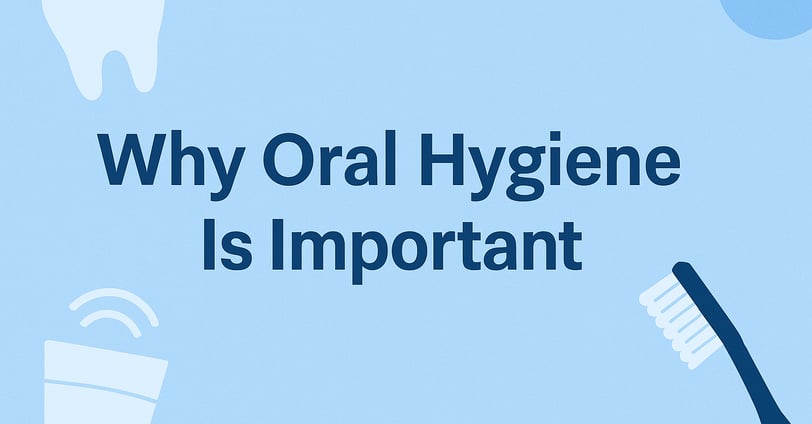Why Oral Hygiene Is Important: A Comprehensive Guide to Dental Health and Overall Well-being
Maintaining good oral hygiene is more than just keeping your teeth white and breath fresh. It's a crucial aspect of your overall health and well-being. Neglecting oral care can lead to a host of dental issues and has been linked to various systemic health problems. In this article, we'll delve into the importance of oral hygiene, its benefits, and practical tips to maintain a healthy mouth.
4/14/20252 min read


What Is Oral Hygiene?
Oral hygiene refers to the practices that keep your mouth clean and disease-free. This includes regular brushing, flossing, and dental check-ups. Effective oral hygiene prevents dental problems like cavities, gum disease, and bad breath and plays a significant role in your overall health.
The Importance of Oral Hygiene:
1. Prevents Tooth Decay and Gum Disease:
Regular brushing and flossing remove plaque—a sticky film of bacteria that forms on teeth. If not removed, plaque can lead to tooth decay and gum disease. Gum disease, or periodontal disease, can cause tooth loss and has been associated with other health issues.
2. Enhances Overall Health:
Poor oral health has been linked to several systemic conditions, including:
Heart Disease: Bacteria from the mouth can enter the bloodstream, leading to inflammation and cardiovascular problems. SELF+1New York Post+1
Diabetes: Gum disease can make it harder to control blood sugar levels, exacerbating diabetes.
Respiratory Infections: Inhaling bacteria from infected teeth and gums can lead to lung infections.
Pregnancy Complications: Poor oral health has been linked to premature births and low birth weight.
3. Maintains Fresh Breath:
Halitosis, or bad breath, often results from poor oral hygiene. Regular cleaning of the mouth reduces the bacteria that cause unpleasant odors.
4. Preserves Tooth Structure:
Preventive care helps maintain the integrity of your teeth, reducing the need for fillings, crowns, or extractions.
5. Boosts Self-Esteem and Confidence:
A healthy smile can enhance your appearance and boost your confidence, positively impacting social interactions and professional opportunities.
Best Practices for Maintaining Oral Hygiene:
1. Brush Your Teeth Twice Daily:
Use a fluoride toothpaste and brush for at least two minutes, ensuring you clean all surfaces of your teeth.
2. Floss Daily:
Flossing removes food particles and plaque between teeth where a toothbrush can't reach.
3. Use Mouthwash:
An antimicrobial mouthwash can help reduce plaque and control bacteria.
4. Maintain a Healthy Diet:
Limit sugary foods and drinks, as they contribute to tooth decay. Eat a balanced diet rich in fruits, vegetables, and whole grains.
5. Regular Dental Check-ups:
Visit your dentist at least twice a year for professional cleanings and to detect any issues early.
Oral Hygiene Across Different Life Stages:
Children:
Instilling good oral habits early sets the foundation for lifelong dental health. Supervise brushing and flossing, and schedule regular dental visits.
Adults:
Stress and lifestyle choices can impact oral health. Be vigilant about maintaining good habits and managing stress.
Seniors:
Aging can bring challenges like dry mouth and gum recession. Regular dental care remains essential to address these issues.
Common Oral Health Problems Due to Poor Hygiene:
Cavities: Caused by plaque buildup and sugar consumption.
Gingivitis: Early stage of gum disease, leading to red and swollen gums.
Periodontitis: Advanced gum disease that can result in tooth loss.
Halitosis: Persistent bad breath due to bacterial buildup.
Conclusion
Oral hygiene is a vital component of overall health. By adopting good oral care practices, you can prevent dental problems and reduce the risk of systemic diseases. Remember, a healthy mouth contributes to a healthy body.
